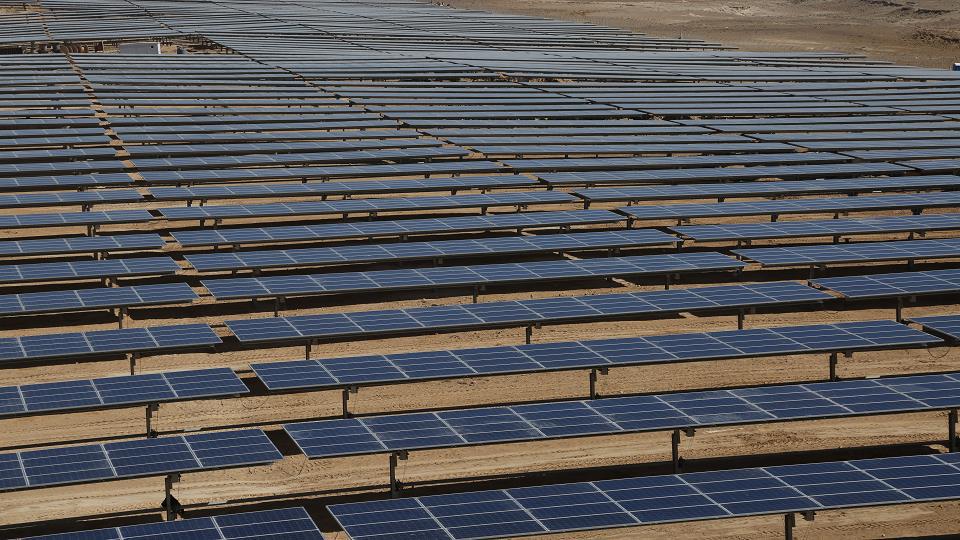Nigerias electricity sector is astonishingly small. Brazil and Pakistan, two countries with similar population sizes, generate 24 times and five times more power than Nigeria, respectively. Nigeria is aiming for 25 GW of installed power capacity by 2020, up from about 4 GW currently.
The country has also recently liberalized its electricity market (generation and transmission assets are fully privatized) and the government hopes this will gradually attract investment after decades of neglect.
Economic troubles abound
Given Nigeria's plentiful solar resource and following the inauguration of a new president a year ago, solar PV growth expectations have gained force but remain checked by economic and financial concerns.
Since President Muhammadu Buhari came to power, oil prices have plummeted from $64 per barrel last May to just over $40 a barrel today. This is crucial because although oil accounts for only 10% of Nigeria's GDP, it also accounts for 70% of the governments revenues and 95% of export earnings.
Nigeria's economy grew about 3% in 2015, almost half the rate of 2014, the stock market is down and foreign currency reserves have dwindled.
Consequently, Nigeria's currency, the naira, is under heavy pressure. Nigerias president refuses to devaluate it fearing this would drive inflation. Instead, the central bank has restricted the supply of dollars and the import of a long list of goods, aiming to safeguard foreign currency reserves and trigger domestic production.
Economists disagree on what's the best remedy for the economy. A devalued currency would make all imports become more expensive. Others stress that the restriction of imports from the state will be even more inflationary than a weaker currency, which would also improve domestic production.
The case for PV
Whatever the case, Nigeria's solar PV sector is hurt.
Currently, there is a dire shortage of foreign currency, making it impossible for many businesses to import vital components and materials.
Nigeria's PV market mainly comprises off-grid PV systems that provide electricity for households and small businesses.
Investors that may target large-scale PV plants worry that any investment they make now in naira will diminish later when the currency is inevitably devaluated.
Foreign investors and financing
Financing through foreign investors remains crucial. However, as highlighted in a report by McKinsey & Company on Africas energy, financial viability, the regulatory environment and the political will are all necessary factors for the power sector to advance.
On the regulatory side, Nigeria has liberalized the energy market and introduced new feed-in tariffs for solar PV plants. The government has also granted license exemptions for plants that generate less than 1 MW in aggregate. The dire economic crisis continues to affect the sectors financial viability and scare off foreigner investors, however.
Commenting on Nigerias liberalization efforts, Professor Chidi Onyia, an advisor to Nigeria's ministry of power, urged fellow Nigerians to join us in this reform process by paying their electric bills.
James Nicholas, co-founder and executive partner of U.S. company Global Business Resources (GBR), which has signed a memorandum of understanding with the Nigerian government to develop a 65 MW ground-mounted PV facility in Kano and Abuja, told pv magazine that the primary focus in the post-privatization era is to ensure the actualization of a healthy and vibrant power sector that will ultimately deliver stable, reliable and affordable power to about 170 million citizens.
Given Nigerians today are struggling to pay for basics like food and fuel, the reform process described by Onyia and Nicholas is in doubt.
Until Nigeria works its way out of its current economic crisis, the only foreign funds that might flow to the countrys solar sector would be via international initiatives such as Power Africa, announced three years ago by U.S. President Barack Obama, which aims to double access to power in sub-Saharan Africa.
Solar PV would go a long way in improving the quality of life for Nigerians, who are forced to queue for gasoline and endure regular electricity blackouts.
This content is protected by copyright and may not be reused. If you want to cooperate with us and would like to reuse some of our content, please contact: editors@pv-magazine.com.


1 comment
By submitting this form you agree to pv magazine using your data for the purposes of publishing your comment.
Your personal data will only be disclosed or otherwise transmitted to third parties for the purposes of spam filtering or if this is necessary for technical maintenance of the website. Any other transfer to third parties will not take place unless this is justified on the basis of applicable data protection regulations or if pv magazine is legally obliged to do so.
You may revoke this consent at any time with effect for the future, in which case your personal data will be deleted immediately. Otherwise, your data will be deleted if pv magazine has processed your request or the purpose of data storage is fulfilled.
Further information on data privacy can be found in our Data Protection Policy.